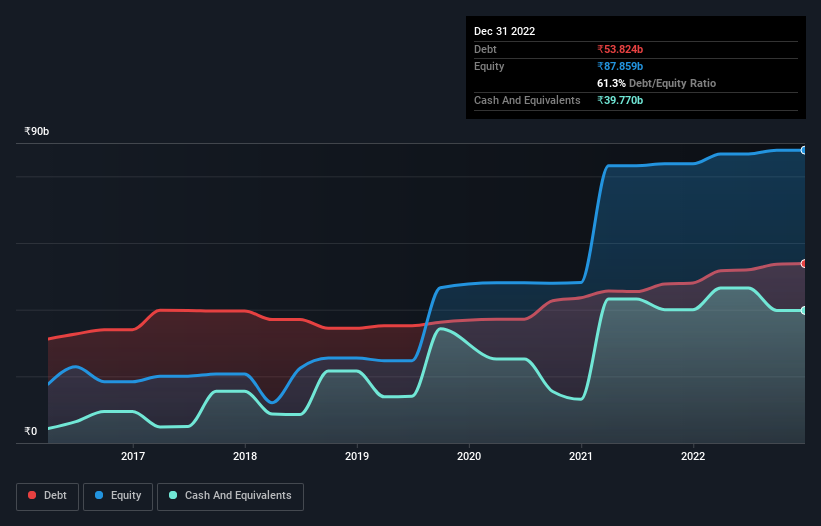- India
- /
- Real Estate
- /
- NSEI:GODREJPROP
These 4 Measures Indicate That Godrej Properties (NSE:GODREJPROP) Is Using Debt Extensively

Howard Marks put it nicely when he said that, rather than worrying about share price volatility, 'The possibility of permanent loss is the risk I worry about... and every practical investor I know worries about.' When we think about how risky a company is, we always like to look at its use of debt, since debt overload can lead to ruin. We note that Godrej Properties Limited (NSE:GODREJPROP) does have debt on its balance sheet. But the real question is whether this debt is making the company risky.
What Risk Does Debt Bring?
Debt assists a business until the business has trouble paying it off, either with new capital or with free cash flow. Part and parcel of capitalism is the process of 'creative destruction' where failed businesses are mercilessly liquidated by their bankers. However, a more frequent (but still costly) occurrence is where a company must issue shares at bargain-basement prices, permanently diluting shareholders, just to shore up its balance sheet. Of course, plenty of companies use debt to fund growth, without any negative consequences. When we examine debt levels, we first consider both cash and debt levels, together.
Check out our latest analysis for Godrej Properties
How Much Debt Does Godrej Properties Carry?
As you can see below, at the end of September 2022, Godrej Properties had ₹53.8b of debt, up from ₹48.0b a year ago. Click the image for more detail. On the flip side, it has ₹39.8b in cash leading to net debt of about ₹14.1b.

A Look At Godrej Properties' Liabilities
The latest balance sheet data shows that Godrej Properties had liabilities of ₹102.3b due within a year, and liabilities of ₹340.4m falling due after that. On the other hand, it had cash of ₹39.8b and ₹30.2b worth of receivables due within a year. So its liabilities outweigh the sum of its cash and (near-term) receivables by ₹32.7b.
Since publicly traded Godrej Properties shares are worth a total of ₹312.3b, it seems unlikely that this level of liabilities would be a major threat. Having said that, it's clear that we should continue to monitor its balance sheet, lest it change for the worse.
We use two main ratios to inform us about debt levels relative to earnings. The first is net debt divided by earnings before interest, tax, depreciation, and amortization (EBITDA), while the second is how many times its earnings before interest and tax (EBIT) covers its interest expense (or its interest cover, for short). This way, we consider both the absolute quantum of the debt, as well as the interest rates paid on it.
As it happens Godrej Properties has a fairly concerning net debt to EBITDA ratio of 9.2 but very strong interest coverage of 1k. This means that unless the company has access to very cheap debt, that interest expense will likely grow in the future. We also note that Godrej Properties improved its EBIT from a last year's loss to a positive ₹1.4b. When analysing debt levels, the balance sheet is the obvious place to start. But ultimately the future profitability of the business will decide if Godrej Properties can strengthen its balance sheet over time. So if you're focused on the future you can check out this free report showing analyst profit forecasts.
Finally, while the tax-man may adore accounting profits, lenders only accept cold hard cash. So it is important to check how much of its earnings before interest and tax (EBIT) converts to actual free cash flow. During the last year, Godrej Properties burned a lot of cash. While that may be a result of expenditure for growth, it does make the debt far more risky.
Our View
Godrej Properties's conversion of EBIT to free cash flow and net debt to EBITDA definitely weigh on it, in our esteem. But the good news is it seems to be able to cover its interest expense with its EBIT with ease. When we consider all the factors discussed, it seems to us that Godrej Properties is taking some risks with its use of debt. So while that leverage does boost returns on equity, we wouldn't really want to see it increase from here. In light of our reservations about the company's balance sheet, it seems sensible to check if insiders have been selling shares recently.
At the end of the day, it's often better to focus on companies that are free from net debt. You can access our special list of such companies (all with a track record of profit growth). It's free.
New: Manage All Your Stock Portfolios in One Place
We've created the ultimate portfolio companion for stock investors, and it's free.
• Connect an unlimited number of Portfolios and see your total in one currency
• Be alerted to new Warning Signs or Risks via email or mobile
• Track the Fair Value of your stocks
Have feedback on this article? Concerned about the content? Get in touch with us directly. Alternatively, email editorial-team (at) simplywallst.com.
This article by Simply Wall St is general in nature. We provide commentary based on historical data and analyst forecasts only using an unbiased methodology and our articles are not intended to be financial advice. It does not constitute a recommendation to buy or sell any stock, and does not take account of your objectives, or your financial situation. We aim to bring you long-term focused analysis driven by fundamental data. Note that our analysis may not factor in the latest price-sensitive company announcements or qualitative material. Simply Wall St has no position in any stocks mentioned.
About NSEI:GODREJPROP
Godrej Properties
Engages in the real estate construction, development, and other related activities in India.
High growth potential with proven track record.


